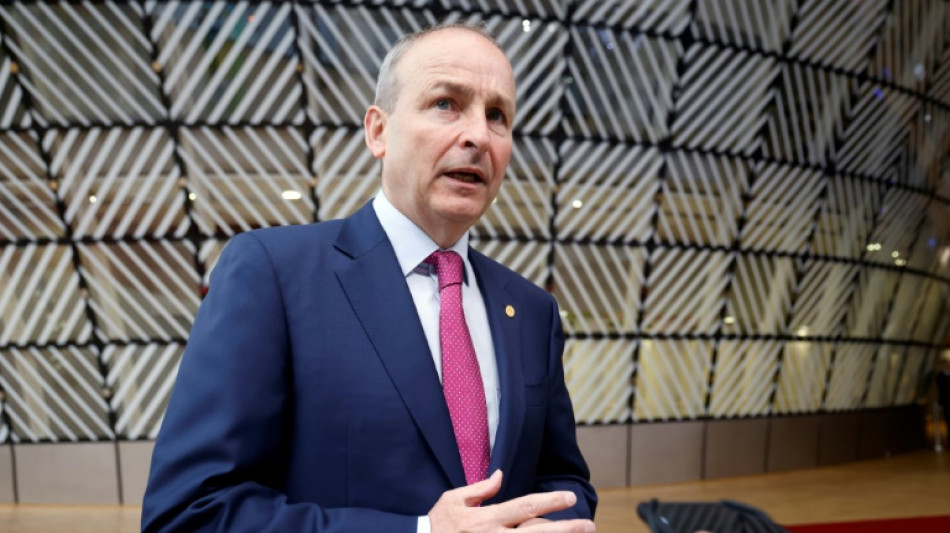
-
 UN nuclear chief in Iran to 'reach diplomatic solutions'
UN nuclear chief in Iran to 'reach diplomatic solutions'
-
Israel face France in Paris football match under tight security

-
 Beijing's fears after Trump fills key posts with China hawks
Beijing's fears after Trump fills key posts with China hawks
-
Man with explosives dies trying to enter Brazil's Supreme Court

-
 South Korea exam sees record number of re-takes after medical reforms
South Korea exam sees record number of re-takes after medical reforms
-
Asian markets mixed as traders weigh Fed; bitcoin above $90,000

-
 Pumas seek historic win over 'hurt' Irish
Pumas seek historic win over 'hurt' Irish
-
Advantage Martin as MotoGP reaches gripping climax in Barcelona

-
 Man with explosives dies trying to enter Brazil Supreme Court
Man with explosives dies trying to enter Brazil Supreme Court
-
Mike Tyson, 58, back in ring to face Youtuber Paul

-
 Hunger in G20 host Brazil is Lula's unfinished fight
Hunger in G20 host Brazil is Lula's unfinished fight
-
Biden, Xi arrive in Peru ahead of face-to-face at Asia-Pacific summit

-
 Mysterious diamond-laden necklace fetches $4.8 mn in Geneva auction
Mysterious diamond-laden necklace fetches $4.8 mn in Geneva auction
-
Lawmakers clash, protesters arrested in wake of Amsterdam violence

-
 Global diabetes rate has doubled in last 30 years: study
Global diabetes rate has doubled in last 30 years: study
-
Six Israeli troops killed, deadly strikes in Lebanon

-
 US envoy says Mexico's 'hugs not bullets' strategy failed
US envoy says Mexico's 'hugs not bullets' strategy failed
-
Lyon and Chelsea stay perfect in Women's Champions League

-
 Alcaraz beats Rublev to open ATP Finals account, Ruud misses last four chance
Alcaraz beats Rublev to open ATP Finals account, Ruud misses last four chance
-
Another clean sheet for Onana as E. Guinea, I. Coast qualify

-
 From 'Little Marco' to 'Mr Secretary': Rubio shows Trump China push
From 'Little Marco' to 'Mr Secretary': Rubio shows Trump China push
-
Sri Lanka president eyes parliament win in snap election

-
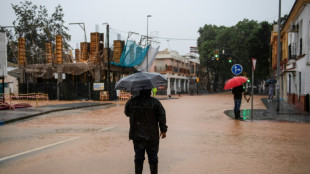 Spain flood epicentre braces for fresh deluge
Spain flood epicentre braces for fresh deluge
-
New York drought conditions fan flames, spur water saving

-
 Football 'world order' is changing, says Brazil coach
Football 'world order' is changing, says Brazil coach
-
Maiden century by Varma gives India unbeatable series lead

-
 Buy now, pay later: Latin America pressured by Chinese online shops
Buy now, pay later: Latin America pressured by Chinese online shops
-
Republicans complete power takeover with House majority

-
 Kane disappointed by England Nations League withdrawals
Kane disappointed by England Nations League withdrawals
-
Trump victory signals golden era for crypto industry

-
 'First Buddy': Musk takes unusual star role with Trump
'First Buddy': Musk takes unusual star role with Trump
-
Workers stage walkout at US maker of Fallout video game

-
 England will not change 'DNA' against South Africa, says Slade
England will not change 'DNA' against South Africa, says Slade
-
Sri Lanka beat New Zealand to go 1-0 up in ODI series

-
 Biden, Xi to meet in Peru on Saturday: US official
Biden, Xi to meet in Peru on Saturday: US official
-
Spurs coach Popovich suffered 'mild stroke', says NBA team

-
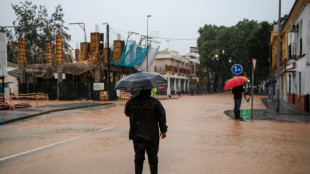 Spain flood epicentre under highest alert for fresh rain
Spain flood epicentre under highest alert for fresh rain
-
Turkey scrubs up its baths to keep hammam tradition alive

-
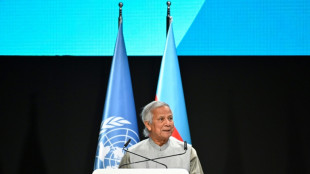 'Very humiliating': Bangladesh's Yunus seethes over climate cash fight
'Very humiliating': Bangladesh's Yunus seethes over climate cash fight
-
'Welcome back': Trump, Biden shake hands in White House

-
 Tech's green wave hits choppy waters
Tech's green wave hits choppy waters
-
Fernandes hopes Amorim can 'change the energy' at Man Utd

-
 Trump, Biden shake hands in White House, vow smooth transfer
Trump, Biden shake hands in White House, vow smooth transfer
-
Gatland battling 'pain' during tough Wales rebuild

-
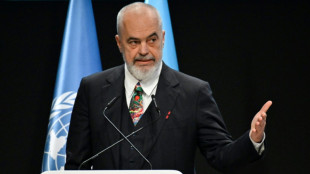 COP29 fight for climate money 'humiliating': Bangladesh's Yunus
COP29 fight for climate money 'humiliating': Bangladesh's Yunus
-
McIlroy aims for glory on happy hunting ground in Dubai

-
 Spain evacuates thousands in fresh flood alarm
Spain evacuates thousands in fresh flood alarm
-
US death row inmate stages jazz protest for release in London court
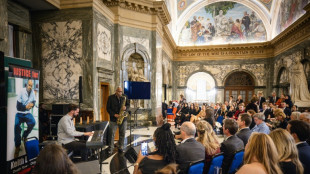
-
 Markets stall, inflation and bitcoin rise amid Trump fears
Markets stall, inflation and bitcoin rise amid Trump fears
-
Germany's embattled Scholz trades blows with rivals as election looms


Ireland marks 100 years since founding of Irish Free State
One hundred years ago on Tuesday, Ireland gained statehood in the midst of a bitter civil war.
But it was not as a republic, as revolutionary leaders had hoped. Instead, a new era began under the ambiguous label of the Irish Free State.
On December 6, 1922, Irish lawmakers gathered to take an oath of allegiance to King George V as a dominion of the British Empire.
It was one in a string of compromises made in the Anglo-Irish Treaty of 1921 that concluded Ireland's three-year war of independence.
Not least among the accommodations made to the imperial power was provision for the continued partition of six, majority Protestant counties in the UK-ruled jurisdiction of Northern Ireland.
Debates in the Irish parliament that day -- among those lawmakers who had not boycotted it entirely -- stressed allegiance to the king was given under duress.
A day after the free state was born, lawmaker Sean Hales was assassinated by gunmen opposed to the treaty as he left lunch at a central Dublin hotel.
In swift and brutal reprisal, the new Irish government executed four anti-treaty prisoners by firing squad without charge or justification.
Irish writer James Joyce captured the mood of many in the nation when he wrote in his novel "Ulysses", published in the same year, that history was "a nightmare from which I am trying to awake".
-'Decade of centenaries'-
The island of Ireland has been reckoning with its turbulent early 20th century history over the last decade -- beginning in 2012 with the commemoration of the opposing reactions in Belfast and Dublin to the prospect of limited devolved governance known as "Home Rule" in 1912.
The "Decade of Centenaries" saw events in Dublin in 2016 for the 1916 Easter Rising -- an armed insurrection by Irish republicans against British rule.
It was marked as a moment of intense national pride in the now republic.
But as the decade has gone on, old divisions about the creation of modern Ireland have resurfaced and which have marked its history ever since.
Last year, Irish President Michael D. Higgins was accused of snubbing an invitation to attend a church service to mark the centenary of the creation of Northern Ireland.
And Irish Prime Minister Micheal Martin said last week that the compromised status gained by Ireland in 1922, and the loss of "a significant part of the population of the island" in Northern Ireland, remained "divisive".
"There was a sense of a lost idealism for the type of state which had been fought for," he told a government-backed conference at University College Dublin (UCD).
- Britain's shadow -
A recent Irish Times poll highlighted the continued schism. In the republic, 66 percent would vote for a united Ireland.
In Northern Ireland, however, 50 percent would vote against while 19 percent were undecided.
The UCD conference laid bare the warts and all legacy of the free state, which lasted 15 years until the passing of a new constitution.
Panels referenced the independent state's entrenchment of Catholic and patriarchal values that eroded women's rights.
Its failure to grapple with forces that would perpetuate mass emigration from Ireland during the 20th century was also highlighted.
"The parents of Ireland (were) wondering, are their children going to have a future in Ireland," said Irish historian Diarmaid Ferriter.
"We do need to think about those who felt they had no stake in the country."
On the plus side, the conference also discussed the 1922 constitution's delivery of an enduring democracy in Ireland and early successes to give the state a voice on the world stage.
Ireland's decision to join the European Union 50 years ago -- perhaps more than any other development in the last century -- allowed Ireland to finally step out of Britain's shadow, said Brigid Laffan, an Irish political scientist at the European University Institute.
If that ended the UK and Ireland's "asymmetric relationship", Brexit also further upended the status quo of the last century, she added.
"What Brexit has done to all of this as it has disturbed territorial politics in the UK and between the two parts of the island," Laffan said.
"The future is much more open because of Brexit than it would have been without."
J.Williams--AMWN
